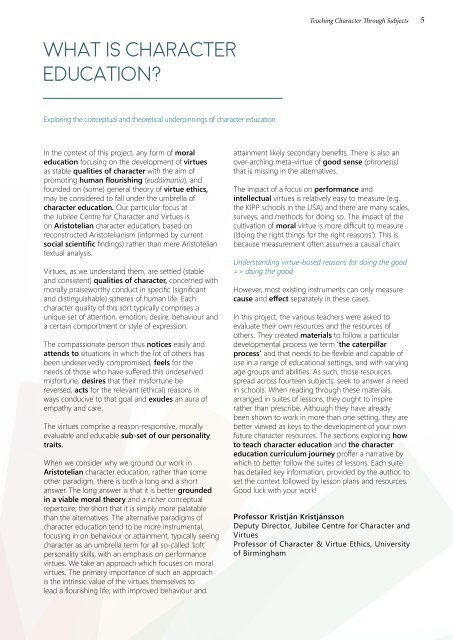INTELLECTUAL
Teaching_Character_Through_Subjects
Teaching_Character_Through_Subjects
Create successful ePaper yourself
Turn your PDF publications into a flip-book with our unique Google optimized e-Paper software.
Teaching Character Through Subjects<br />
5<br />
WHAT IS CHARACTER<br />
EDUCATION?<br />
Exploring the conceptual and theoretical underpinnings of character education<br />
In the context of this project, any form of moral<br />
education focusing on the development of virtues<br />
as stable qualities of character with the aim of<br />
promoting human flourishing (eudaimonia), and<br />
founded on (some) general theory of virtue ethics,<br />
may be considered to fall under the umbrella of<br />
character education. Our particular focus at<br />
the Jubilee Centre for Character and Virtues is<br />
on Aristotelian character education, based on<br />
reconstructed Aristotelianism (informed by current<br />
social scientific findings) rather than mere Aristotelian<br />
textual analysis.<br />
Virtues, as we understand them, are settled (stable<br />
and consistent) qualities of character, concerned with<br />
morally praiseworthy conduct in specific (significant<br />
and distinguishable) spheres of human life. Each<br />
character quality of this sort typically comprises a<br />
unique set of attention, emotion, desire, behaviour and<br />
a certain comportment or style of expression.<br />
The compassionate person thus notices easily and<br />
attends to situations in which the lot of others has<br />
been undeservedly compromised, feels for the<br />
needs of those who have suffered this undeserved<br />
misfortune, desires that their misfortune be<br />
reversed, acts for the relevant (ethical) reasons in<br />
ways conducive to that goal and exudes an aura of<br />
empathy and care.<br />
The virtues comprise a reason-responsive, morally<br />
evaluable and educable sub-set of our personality<br />
traits.<br />
When we consider why we ground our work in<br />
Aristotelian character education, rather than some<br />
other paradigm, there is both a long and a short<br />
answer. The long answer is that it is better grounded<br />
in a viable moral theory and a richer conceptual<br />
repertoire; the short that it is simply more palatable<br />
than the alternatives. The alternative paradigms of<br />
character education tend to be more instrumental,<br />
focusing in on behaviour or attainment, typically seeing<br />
character as an umbrella term for all so-called ‘soft’<br />
personality skills, with an emphasis on performance<br />
virtues. We take an approach which focuses on moral<br />
virtues. The primary importance of such an approach<br />
is the intrinsic value of the virtues themselves to<br />
lead a flourishing life; with improved behaviour and<br />
attainment likely secondary benefits. There is also an<br />
over-arching meta-virtue of good sense (phronesis)<br />
that is missing in the alternatives.<br />
The impact of a focus on performance and<br />
intellectual virtues is relatively easy to measure (e.g.<br />
the KIPP schools in the USA) and there are many scales,<br />
surveys, and methods for doing so. The impact of the<br />
cultivation of moral virtue is more difficult to measure<br />
(‘doing the right things for the right reasons’). This is<br />
because measurement often assumes a causal chain:<br />
Understanding virtue-based reasons for doing the good<br />
=> doing the good<br />
However, most existing instruments can only measure<br />
cause and effect separately in these cases.<br />
In this project, the various teachers were asked to<br />
evaluate their own resources and the resources of<br />
others. They created materials to follow a particular<br />
developmental process we term ‘the caterpillar<br />
process’ and that needs to be flexible and capable of<br />
use in a range of educational settings, and with varying<br />
age groups and abilities. As such, those resources,<br />
spread across fourteen subjects, seek to answer a need<br />
in schools. When reading through these materials,<br />
arranged in suites of lessons, they ought to inspire<br />
rather than prescribe. Although they have already<br />
been shown to work in more than one setting, they are<br />
better viewed as keys to the development of your own<br />
future character resources. The sections exploring how<br />
to teach character education and the character<br />
education curriculum journey proffer a narrative by<br />
which to better follow the suites of lessons. Each suite<br />
has detailed key information, provided by the author, to<br />
set the context followed by lesson plans and resources.<br />
Good luck with your work!<br />
Professor Kristján Kristjánsson<br />
Deputy Director, Jubilee Centre for Character and<br />
Virtues<br />
Professor of Character & Virtue Ethics, University<br />
of Birmingham


